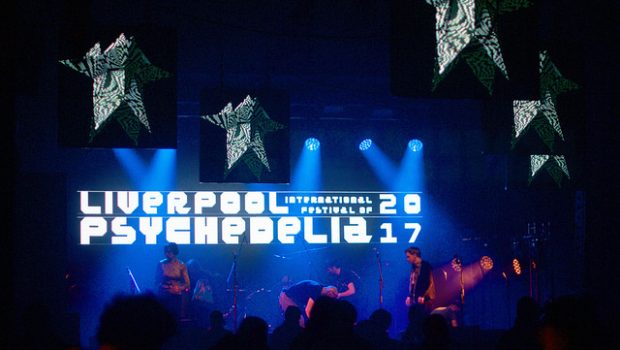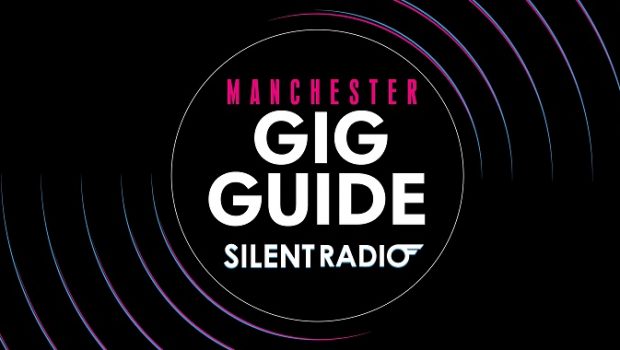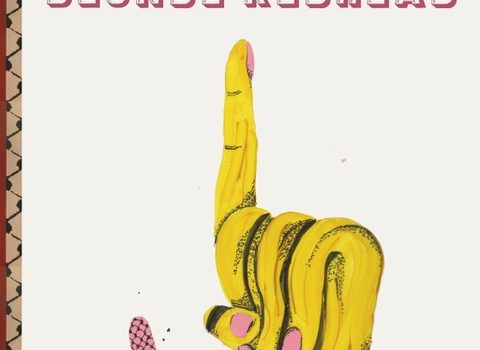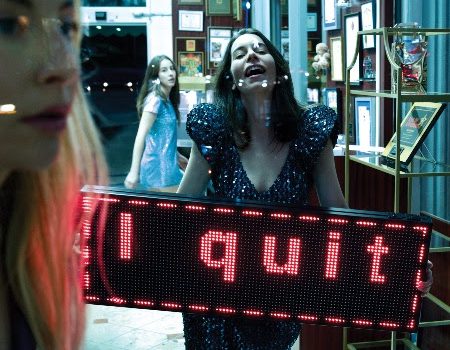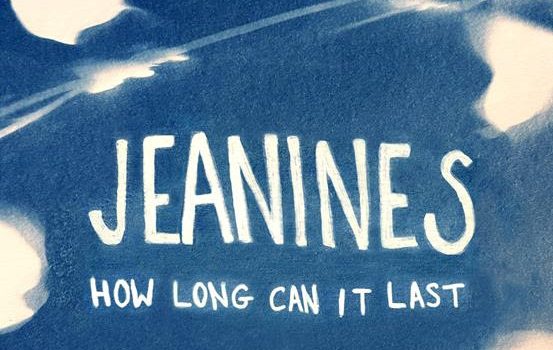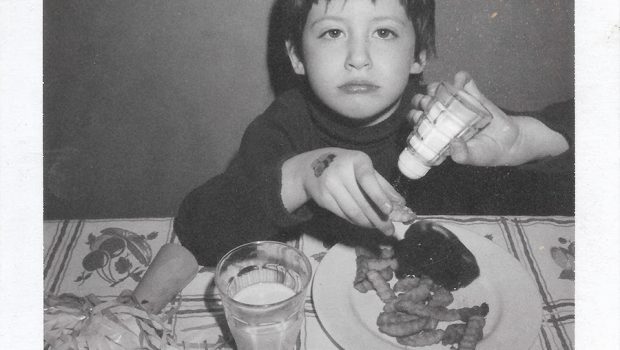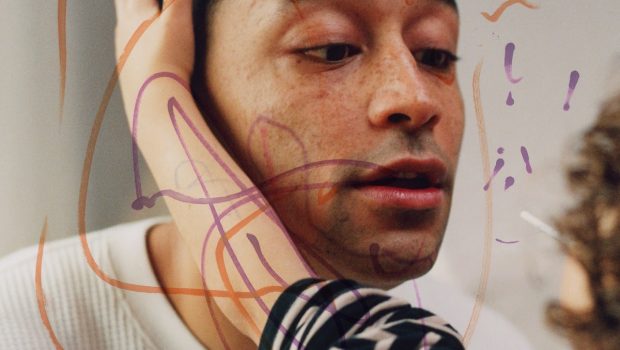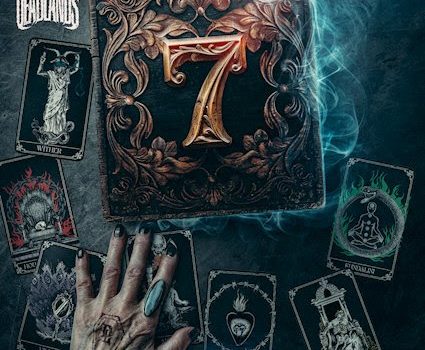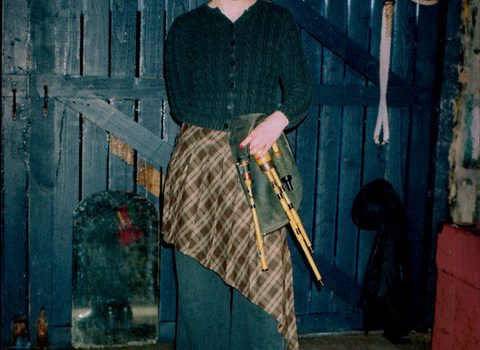They may have been part of the Creation Records scene in the early 90’s but The Telescopes are a band who have led the way in psychedelic swirling indie for over thirty years. Now very much the solo project of Stephen Lawrie, The Telescopes have a new album on the horizon, ‘Songs Of Love And Revolution’, and it’s a beautiful beast. Part noise, part space rock, part dream pop, “The Telescopes can’t be tied down” says Lawrie.
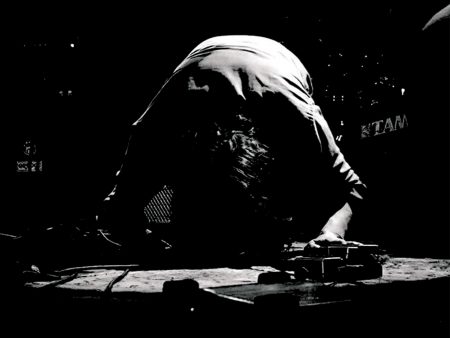 To listen to a Telescopes album is to immerse yourself in a lush tapestry of psychedelic guitars, melodies and warm fuzzed up tones which with each album has morphed and grown into new forms. The debut album ‘Taste’ (1989) and its self-titled follow up on Creation Records in 1992, both sent a musical firework into the UK indie scene, by combining heavy duty guitar noise with melodies, and saw The Telescopes, along with Loop and Spacemen 3 being hailed as the ground breakers for the UK’s psychedelic indie scene, Testament to their influence over the years, are the acknowledgements from a whole range of artists including Portishead who asked them to play when they curated the ATP Festival in London in 2011, as well seeing The Telescopes invited to play numerous psych festivals all over the world. Although the psych genre is a convenient term encompassing some of what The Telescopes music sounds like, it doesn’t cover the whole of Lawrie’s musical vision, so does that label bother him? “No not at all, I mean I think we’ve got a foot in all of them really, it’s just nice to be accepted, but I don’t think we belong to any of them. I’d describe it as the Telescopes house has many rooms, really. There’s lots of different shades to the music.”
To listen to a Telescopes album is to immerse yourself in a lush tapestry of psychedelic guitars, melodies and warm fuzzed up tones which with each album has morphed and grown into new forms. The debut album ‘Taste’ (1989) and its self-titled follow up on Creation Records in 1992, both sent a musical firework into the UK indie scene, by combining heavy duty guitar noise with melodies, and saw The Telescopes, along with Loop and Spacemen 3 being hailed as the ground breakers for the UK’s psychedelic indie scene, Testament to their influence over the years, are the acknowledgements from a whole range of artists including Portishead who asked them to play when they curated the ATP Festival in London in 2011, as well seeing The Telescopes invited to play numerous psych festivals all over the world. Although the psych genre is a convenient term encompassing some of what The Telescopes music sounds like, it doesn’t cover the whole of Lawrie’s musical vision, so does that label bother him? “No not at all, I mean I think we’ve got a foot in all of them really, it’s just nice to be accepted, but I don’t think we belong to any of them. I’d describe it as the Telescopes house has many rooms, really. There’s lots of different shades to the music.”
When you first started, there weren’t many bands doing what you were doing. Now there’s loads, do you feel that the world has finally come round to your way of thinking?” It’s strange, because say like between 2000-2010 when people were asking us what we do, I would say basically we’re a psych band, because it was just easier to say that at the time, as it covered a lot of stuff. But then this psych genre started coming back (laughs), and I’m like, ‘Whoa, whoa, I’d better stop saying that, because I don’t want to become tied to that’, as they all very much had a certain sound. I can hear a lot of Brian Jonestown Massacre in a lot of these bands and a lot of Black Angels and stuff like that. The Telescopes can’t be tied down to anything like that.”
The power of Telescopes’ enduring appeal can also be found in the remixes which appear in the special ‘Dinked’ edition of ‘Songs Of Love And Revolution’. A limited release of the album only available from independent record shops, the special ‘Dinked’ edition has remixes from a whole host of musicians as Lawrie explains: “We’ve got people like Lloyd Cole of Lloyd Cole & The Commotions, doing a remix of ‘Strange Wave’, Anton from the Brian Jonestown Massacre doing ‘Come Bring Your Love’ And Matt Elliot from Third Eye Foundation, there’s a whole bunch of them.”
How did you come to work with these people? Did you pick people who were already friends or did you have a list of people who you’d thought’ I’d like to hear their take on my songs’?
“Well, Matt Elliot from Third Eye Foundation, I’ve liked his music for a long while, but we didn’t meet until a few years ago but then kept in touch. He was in mind. It was actually the record label’s idea to do the remix album, and they presented a few artists that wanted to work on it, and then I chose a few myself. Lloyd Cole had done some work on the same label or their sister label, and I was really happily surprised that he wanted to work with us you know. We’re absolute opposite ends of the 80’s spectrum really (laughs), and Anton I’ve known for quite a while now, as people out of his band play in my band.”
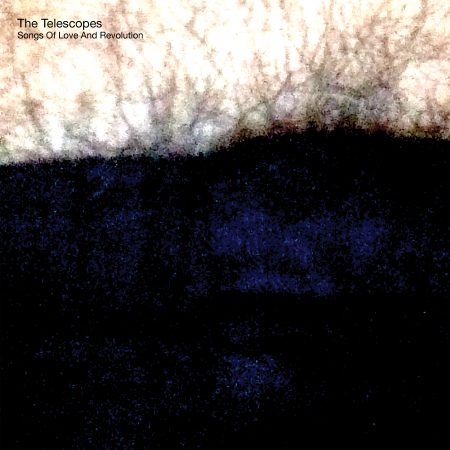 The fact the album came out at all during these strange times, is due to the sheer perseverance of Lawrie, who revealed that the whole album was recorded and mastered in four weeks as “It’s good to keep a kind of momentum so your head is constantly in it”, and has lyrical themes which suit these bizarre years perfectly. Album opener ‘This Is Not A Dream’ manages to put into a swirling pot of noisy guitar melodies the feeling most of us have about the times we find ourselves in, with its lyric of ”nothing seems how it should seem” as Lawrie elaborates “that was written during the first lockdown, during the first three months, it was like a state of mesma really wasn’t it, it was ‘is this really happening?’ but it wasn’t a dream.”
The fact the album came out at all during these strange times, is due to the sheer perseverance of Lawrie, who revealed that the whole album was recorded and mastered in four weeks as “It’s good to keep a kind of momentum so your head is constantly in it”, and has lyrical themes which suit these bizarre years perfectly. Album opener ‘This Is Not A Dream’ manages to put into a swirling pot of noisy guitar melodies the feeling most of us have about the times we find ourselves in, with its lyric of ”nothing seems how it should seem” as Lawrie elaborates “that was written during the first lockdown, during the first three months, it was like a state of mesma really wasn’t it, it was ‘is this really happening?’ but it wasn’t a dream.”
Another sublime psyched up noisy gem is ‘The Train’ with its mantra of “This train keeps on going” a call to persevere regardless of what’s happening around you as Lawrie explains: “I was travelling between my own place, where I record, and my support bubble with my fiance. The first time I went on a train after that first lockdown was a very strange experience, with a mask and seats blocked off, and the stations were ghostly and stuff like that. It’s kind of a play on words a well, this train… this strain’, but also the first thing I would hear every time I got off there was “ This train is for….” you know, insert destination. I was constantly hearing it, and then it just sounded even more Orwellian in a way I guess.”
There’s also the brilliantly titled ‘We See Magic And We Are Neutral Unnecessarily’ which climbs into the musical stratosphere, the words lifted from a conversation Lawrie had with friend “talking about life, music and art and stuff like that and the natural order of things and surrendering to that.” Then there’s the comforting album closer of ‘Haul Away The Anchor’ a traditional folk tune which pays homage to Lawrie’s fiance’s father-in-law as he reflects: “My father-in-law to be caught the virus at the end of the first lockdown, and that was music that was chosen as the exit music at his funeral so it’s a very emotive departure song. I mean, my partner and I were just sitting there chatting away about it and I said ‘what if I did my own version of that, tried it out as a closer of the album’. I sat there thinking about it, and thought I’ve got an organ that would make the right sound for that, so I got this Italian Antonelli wind organ out, and switched it on, and one of the keys was jammed and it was jammed in the exact tuning of that song. It was just droning away, and so with my right hand I just started playing the melody of the song over it, and thought, ‘that’s just meant to be’. Listened back to the recording and it sounded lovely. He’s from Cornwall so we recorded some Cornish harbour sounds and added those”.
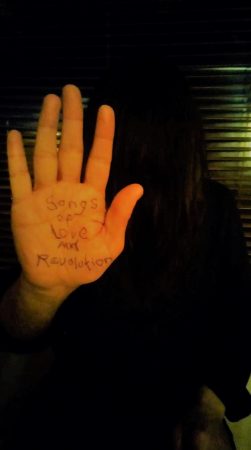 For Lawrie, musical inspirations can be found pretty much anywhere, not just reflected in the world around us or the everyday situations we find ourselves in. Having previously cited bands such as Suicide, Sonic Youth, Velvet Underground as musical favourites of his in the early days of The Telescopes, nowadays as long as he can create a personal connection to an idea, lyric or sound, it’s ripe for musical investigation: ”I can get inspired by anything really, I’m not exclusively inspired by music so much anymore, and I wasn’t back then either. It was as much about ways of writing lyrics as it was about the music. Things have to be lived in for me, there has to be lots of me in the words, even if it’s only a few sentences in a song. I mean you hear them so much, you do all the different takes, you go through all the recording and mixing processes, mastering and listening to the final thing, and then you go out on the road and you play it hundreds of times. So, you have to be able to keep doing that. I mean I listen to so much music, a complete wide spectrum, I’m not really genre orientated at all, I believe there’s something great to hear in each genre.”
For Lawrie, musical inspirations can be found pretty much anywhere, not just reflected in the world around us or the everyday situations we find ourselves in. Having previously cited bands such as Suicide, Sonic Youth, Velvet Underground as musical favourites of his in the early days of The Telescopes, nowadays as long as he can create a personal connection to an idea, lyric or sound, it’s ripe for musical investigation: ”I can get inspired by anything really, I’m not exclusively inspired by music so much anymore, and I wasn’t back then either. It was as much about ways of writing lyrics as it was about the music. Things have to be lived in for me, there has to be lots of me in the words, even if it’s only a few sentences in a song. I mean you hear them so much, you do all the different takes, you go through all the recording and mixing processes, mastering and listening to the final thing, and then you go out on the road and you play it hundreds of times. So, you have to be able to keep doing that. I mean I listen to so much music, a complete wide spectrum, I’m not really genre orientated at all, I believe there’s something great to hear in each genre.”
Now receiving much more recognition for their influence on countless guitar bands, it’s hard to believe that for a time in the early 2000’s Lawrie became so disillusioned with the music industry and The Telescopes place in it, that for a while he took a much needed break as he explains: “Well, I felt I didn’t have a choice really. After the second album, things became so hit orientated and it’s coming at me from all angles, and I just kind of lost focus. You sit down to write, and I’ve never sat down to write a hit record in my life. I get inspired by something and I write a song and it makes me feel better as a human being (laughs). I got to the point where I wasn’t getting that anymore and I had to down tools for a while and then after a while you start finding a new way of working, when the dust settles you start getting the bug again. For me it was technology, because one of the problems we had was that our first album was so vastly different to the second, and I think that shocked a lot of people as well, but after a while I found that it gave me a lot of freedom, like the third album could be anything I wanted really, as long as it was good!”
You mentioned the second album and the pressure you felt to write a hit. Around that time you were on Creation Records, and there’s so many myths and stories about that label, did you manage to still enjoy your time as a musician on that label back then?
“Yes, very much so. They were all massive music fans there and worked hard and played hard!”
Defiantly doing things your own way, and following your own vision is what runs through the core of The Telescopes, and why they’ve remained an integral part of the UK music scene for so long. If he could look back on his career and give his younger self any advice, that’s the message to adhere to, as Lawrie reflects: “Trust your instincts. Never forget why you started doing it in the first place. Be true, no matter what, just hold your ground. If you think you’re right about a decision and you feel really passionate about it, then go with it no matter what, if you lose your record deal, or you get slagged off by the whole media, or if everyone stops buying your records or burns them, stand by it!”
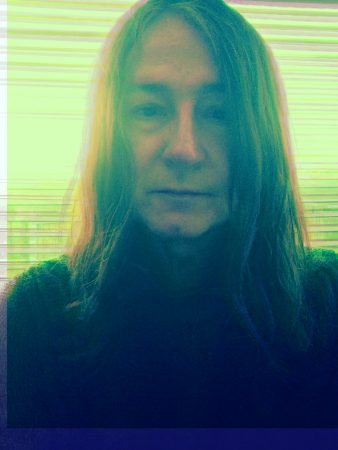 Sticking to his vision with a renewed enthusiasm, after almost ten years away, The Telescopes third album emerged in 2002 with a more experimental and electronic edge to its musical soundscapes as Lawrie adds “It was getting a little bit that way towards the end of Creation. There were some tracks that didn’t get released until much later, where they were following on from the kind of things I was doing on the ‘Flying EP’, some of the tracks on there, where we’d go in as a band and record a very conventional song. Then Richard Formby who produced us and myself would just tear that song apart. We’d take away anything that vaguely irritated us and come up with ideas of what we could replace it with, what it needed. We’d completely tear things apart and make samples, tape loops, all sorts of things. So it was becoming a bit more like that anyway, but getting to grips with the new technologies that were coming along like software programmes, I spent a lot of time just building it up naturally by myself and then I’d get other musicians in. I’d have ideas that I thought would sound good with clarinets, horns, that type of thing, bring them in, and that album ended up having so many musicians on it, so many that we managed to play it live just once. It was just going to be too excessive to take on the road. There’s pianos, organs, sitars, horn sections, it was just massive!”
Sticking to his vision with a renewed enthusiasm, after almost ten years away, The Telescopes third album emerged in 2002 with a more experimental and electronic edge to its musical soundscapes as Lawrie adds “It was getting a little bit that way towards the end of Creation. There were some tracks that didn’t get released until much later, where they were following on from the kind of things I was doing on the ‘Flying EP’, some of the tracks on there, where we’d go in as a band and record a very conventional song. Then Richard Formby who produced us and myself would just tear that song apart. We’d take away anything that vaguely irritated us and come up with ideas of what we could replace it with, what it needed. We’d completely tear things apart and make samples, tape loops, all sorts of things. So it was becoming a bit more like that anyway, but getting to grips with the new technologies that were coming along like software programmes, I spent a lot of time just building it up naturally by myself and then I’d get other musicians in. I’d have ideas that I thought would sound good with clarinets, horns, that type of thing, bring them in, and that album ended up having so many musicians on it, so many that we managed to play it live just once. It was just going to be too excessive to take on the road. There’s pianos, organs, sitars, horn sections, it was just massive!”
Grand musical visions can sometimes be hard to convey to others, which is why these days Lawrie mostly writes The Telescopes material on his own, however collaboration can also yield surprising results ”Some of the stuff I’ve done has been improvised so that’s like dealing with a map of coordinates, we’re going from A to D to B to E then back to A or something, or it can be much more vague. We did an album ‘Harm’ (in 2013) and on side two of that, I basically said to the musicians, ‘think of the last song of the first album by Suicide and keep it in your mind but never play it!” (laughs). For ‘Songs Of Love And Revolution’ there was less of the Brian Eno abstract instructions vibe, with Lawrie forced to work on his own ”I was really trying to replicate what we’ve been doing live in 2019.. I originally intended to record it with that line up, but ended up having to do it all by myself, and it was a very different way of doing it in some ways.”
Although the tours have had to be put on hold, Lawrie seems to be making the most of his time at home, working on various projects in his studio, and revealed two new works on the horizon. One of them being a film score he has been providing the lyrics for: “I am working on something at the moment for a friend of mine who’s working on some music for a film, and he’s done the music and he’s got titles for all of these pieces, so I asked him for brief descriptions of what he was thinking, I said it can be as abstract as you like just give me some clues, some ways in, and that’s been a fascinating way to write as well. Then I go away and come up with some lyrics to his music.”
Then there’s an acoustic album also in the pipeline, which may be a surprise to some who consider The Telescopes predominantly a ‘noise’ band, which is a misconception Lawrie hopes to challenge: ”That’s going to be called ‘Absence Presence’, that’s very much like the acoustic shows I do, just me and the acoustic and occasionally a bit of a Casio keyboard or an organ of some description….There’s some of the tracks from this album, there’s acoustic versions of some of those. It’s just basically as I write things, it’s a glimpse within the noise to show that there’s songs going on there. I’ve had people in the past, Richard Formby (Telescopes’ producer) told me years and years ago when ‘Taste’ first came out, a friend of his was a bit of a singer-songwriter type and he really didn’t get The Telescopes. Richard turned round to him and said, “Well you know Stephen writes all these songs on an acoustic guitar…”, and the guy just couldn’t get his head around it. Once he got his head around it, he started enjoying the music.”
Yeah, because people often focus on the noise element first, then often miss out on the subtle melodies that are going on underneath.
“Some people, even reviewers, have said that it’s just some kind of jam or something and it’s not! (laughs). It’s an orchestrated song. To me it doesn’t matter how it’s made, it’s what you hear, if you like what’s coming out of the speakers then that’s the end of it you know.”
The Telescopes: Songs Of Love And Revolution – Out 5th February 2021 (Tapete Records)
